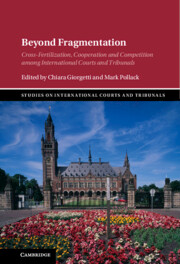 Beyond Fragmentation
Beyond Fragmentation Book contents
- Beyond Fragmentation
- Studies on International Courts and Tribunals
- Beyond Fragmentation
- Copyright page
- Dedication
- Contents
- Contributors
- Foreword
- Preface
- 1 Beyond Fragmentation
- 2 The Procedural Cross-Fertilization Pull
- 3 Procedural Convergence in International Courts and Tribunals
- 4 New Media Evidence across International Courts and Tribunals
- 5 The Acquis Judiciaire, a Tool for Harmonization in a Decentralized System of Litigation?
- 6 Why Cite External Legal Sources?
- 7 Of Gardeners and Bees
- 8 A View from the Coal Face
- 9 Agents of Cross-Fertilization
- Index
8 - A View from the Coal Face
The Authors of Cross-Fertilization from the Perspective of the Permanent Court of Arbitration
Published online by Cambridge University Press: 28 April 2022
- Beyond Fragmentation
- Studies on International Courts and Tribunals
- Beyond Fragmentation
- Copyright page
- Dedication
- Contents
- Contributors
- Foreword
- Preface
- 1 Beyond Fragmentation
- 2 The Procedural Cross-Fertilization Pull
- 3 Procedural Convergence in International Courts and Tribunals
- 4 New Media Evidence across International Courts and Tribunals
- 5 The Acquis Judiciaire, a Tool for Harmonization in a Decentralized System of Litigation?
- 6 Why Cite External Legal Sources?
- 7 Of Gardeners and Bees
- 8 A View from the Coal Face
- 9 Agents of Cross-Fertilization
- Index
Summary
This chapter focuses on one author of cross-fertilization, the Permanent Court of Arbitration (PCA). The PCA plays various roles in the development of international law. In recent decades the PCA has seen significant procedural cross-fertilization among international institutions, for example with the UNCITRAL Arbitration Rules informing the PCA’s own modern rules of procedure. PCA-administered tribunals have engaged in substantive cross-fertilization, citing ICJ decisions as well as awards issued by PCA- and ICSID-administered tribunals, among others. There are limits to the PCA’s role in cross-pollination and convergence, particularly the principle of party autonomy and and excess of mandate by the tribunal being grounds for an award to be set aside. Party-driven limits to convergence are exemplified in the high degree of variation in transparency among PCA-administered arbitrations, with proceedings ranging from the highly transparent to the fully confidential. Despite these limits, this chapter concludes that both as an actor and as a framework, the PCA serves as a mechanism whereby procedural law and substantive international law are distilled, developed, and diffused.
Keywords
- Type
- Chapter
- Information
- Beyond FragmentationCross-Fertilization, Cooperation and Competition among International Courts and Tribunals, pp. 218 - 241Publisher: Cambridge University PressPrint publication year: 2022
